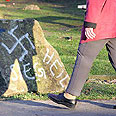
Photo: AP
TEL AVIV - Europe has seen a significant rise in anti-Semitic violence, according to a report published by the Jewish Agency and the Ministry of Diaspora Affairs today.
The data, which was published in preparation for the International Fight Against Anti-Semitism Day and to mark 60 years since the liberation of the Auschwitz concentration camp, shows that despite efforts by European governments to abolish anti-Semitism during the past year and a half, Europe has seen a rise in anti-Semitic violence in 2004.
According to the data, some 282 violent incidents occurred in Europe over the past year; most of the perpetrators were Arabs and Muslims, some of which were Palestinians.
Amos Oren of the Zionist Federation says anti-Semitism exists in every western country at some level today.
“Until 2002, there was wide-ranging denial regarding the existence of anti-Semitism in Europe, and the incidents were depicted as acts of hooliganism,” he says. “Sine then, the governments have changed their attitudes and are treating the phenomenon with severity.”
No Change in France
However, the European governments’ efforts are not always successful.
Tehila Nachlon, an advisor to Diaspora Minister Natan Sheransky for anti-Semitic affairs, says despite the French government’s efforts, which include arrests of violent Muslim activists and the shutting down of Hezbollah’s television station, violent anti-Semitic incidents have not declined.
She says that in Britain, the number of anti-Semitic incidents has almost doubled, as some 310 incidents, 77 of which were violent, occurred in 2004, as opposed to 163 incidents, 55 were of which violent, which occurred in 2003.
The report says most of the violent incidents include the desecration and burning of synagogues, and street violence that was aimed mainly at Orthodox Jews. Since 2000, more than 100 synagogues were desecrated in England alone, the report says.
According to the report, 295 anti-Semitic incidents were reported in former Soviet-Union countries during the past year, as opposed to 146 incidents in 2003.
Diaspora Minister Natan Sheransky says western European anti-Semitism is different than anti-Semitism within the former Soviet republics.
“As opposed to western Europe, where the anti-Semitism is based on hatred toward Israel, in the former Soviet republics this new anti-Semitism phenomenon barely exists,” he says. “It is replaced by classic anti-Semitism that has always been hidden and is erupting today due to a rising nationalistic and Muslim atmosphere in the former Soviet Union.”
Russian President Vladimir Putin is well aware of the anti-Semitism problem in Russia, and he has promised to fight the phenomenon vehemently, says Sheransky.















